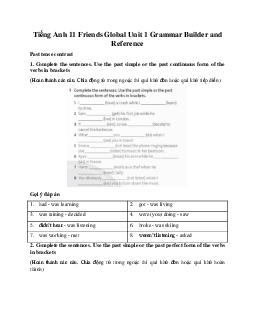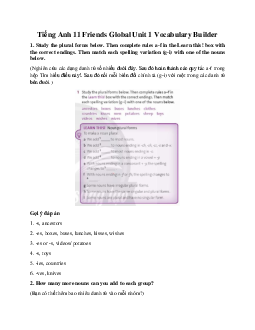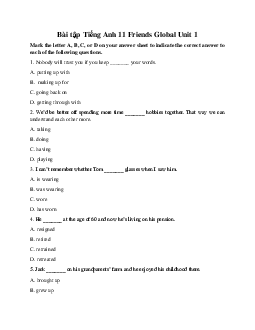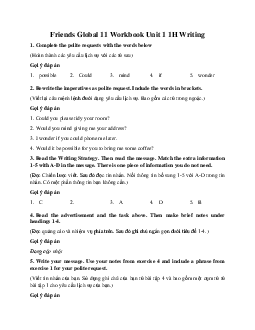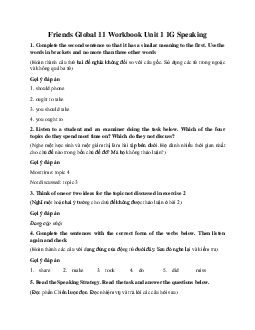




Preview text:
Tiếng Anh 11 Friends Global Unit 1 1I Culture Bài đọc
1. SPEAKING Describe the photos. Can you name the ethnic groups in the photos?
(Mô tả các bức ảnh. Bạn có thể kể tên các nhóm dân tộc trong ảnh?) Gợi ý đáp án
In the first and the second pictures, I can see two different ethnic groups of Vietnam
because they are wearing different costumes. I guess they are performing at the famous
festivals of their cultures because I can see they are dancing with some special musical
instruments. On the other hand, in the third picture, I can see three children, they can be
from 10 to 16 years old. Looking at the background and their clothes, I'm sure that they
are also an ethnic group living in a mountainous area.
In the first picture, they are Muong. In the second picture, they are Cham. In the third picture, they are H’mong.
2. Read the text. Where in Viet Nam do these people live?
(Đọc văn bản. Những người này sống ở đâu tại Việt Nam?) Gợi ý đáp án
1. Tay: in North East provinces
2. Muong: in Phu Tho Province, Hoa Binh Province 3. Khmer: in the Mekong Delta
4. Thai: in Phu Tho Province, Hoa Binh Province
3. Read the text again. Are these statements true or false? Write (T) and (F).
(Đọc lại văn bản. Những câu này đúng hay sai? Viết (T) và (F).) Gợi ý đáp án 1. T 2. F 3. F
4. Listen to three Westerners talking about the wedding ceremonies they witnessed
in Viet Nam. Which ethnic groups are mentioned by the speakers?
(Hãy nghe ba người phương Tây nói về những nghi thức đám cưới mà họ đã chứng kiến
ở Việt Nam. Người nói đề cập đến những dân tộc nào?) Gợi ý đáp án Speaker 1: Thai Speaker 2: Tay Speaker 3: Nung Nội dung bài nghe
Speaker 1 During my years as a visiting professor, I was once invited to my student’s
wedding in Hoa Binh province. It was fabulous to see the guests in their traditional
wedding clothes, and witness the different wedding customs. I don’t know the language,
but I could say everyone was welcoming the bride into the new family and wishing the
couple all the best. My student said that he had spent 3 years living with his fiancé’s
family before getting the girl’s permission to marry her.
Speaker 2 It was so nice to be part of the ceremony. I was fascinated by all the singing
throughout the day. All the exchanges between the two families, I mean the greetings, the
good wishes, the teachings of the superiors, were inthe form of songs and chants. You
could feel their joy and emotions through the music. I managed to make out the meanings
of the lyrics thanks to the books and articles about traditional weddings I had read.
Speaker 3 That was the first time I had been to a wedding ceremony in Viet Nam. I was
lucky enough to have a chance to see the bride receiving the water from a family member
and pouring it into a container. It was so solemn. The bride looked gorgeous! I had
watched a documentary about this practice. Well, it reminds the bride of her duties as a
caretaker of her own family. Attending a traditional ceremony like that was something I
had always wanted to do, but I didn’t manage it on my first trip to Viet Nam.
5. Listen again. Match the sentences with the speakers (1-3). Some sentences match
with more than one speaker.
(Lắng nghe một lần nữa. Nối các câu với người nói (1-3). Một số câu phù hợp với nhiều hơn một người nói.) Gợi ý đáp án A. 1 - 2 B. 2 C. 3 D. 3 E. 2 - 3
6. SPEAKING Work in pairs. Discuss these questions.
(Làm việc theo cặp. Thảo luận những câu hỏi sau.) Gợi ý đáp án
1. A: Which ethnic groups are you in contact with most often?
B: The ethnic group I am in contact with most often is Kinh because I was born in city
and most of them live here, too.
A: Can you tell me what is most special about them?
B: The Kinh uses the official language of Vietnam, Vietnamese, as the main language. In
Vietnamese society, the Kinh have played a vital part in Vietnamese culture and tradition
as well as developing the economy.
2. A: How are weddings held in your family?
B: The groom’s family and the bride’s family will meet each other to choose the best day
for them to celebrate their wedding party. On the wedding day, the groom’s family and
relatives go to the bride’s house bringing a lot of gifts wrapped in red papers. Ladies and
women are all dressed in Ao Dai. Men could be in their suits or men traditional Ao Dai.
The couple should pray before the altar ask their ancestors for permission for their
marriage, then express their gratitude to both groom and bride’s parents for raising and protecting them.
A: What customs do you find the most meaningful?
B: I like the moment when they bow their heads to each other to show their gratitude and
respect toward their soon-to-be husband or wife. I also like the moment when their
parents take turns to share their experience and give blessings. For me, it’s extremely meaningful.
